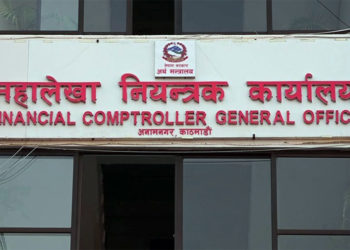KATHMANDU: Economic Digest offers a concise yet comprehensive overview of significant business happenings in Nepal, presented in easily digestible summaries.
The recent developments in Nepal highlight significant shifts across economic, infrastructural, and political landscapes. The NRB’s proposed overhaul of the gold quota system aims to enhance transparency and reduce inefficiencies in gold imports, signaling regulatory reforms in trade.
Meanwhile, the business community’s condemnation of the Tinkune violence underscores growing concerns over the impact of protests on economic stability. The insurance sector has expanded coverage to 44.17% of the population, yet general insurance penetration remains low despite increased premium collections.
In labor rights, NHRC and ILO’s five-year agreement emphasizes the importance of fair employment conditions, particularly for migrant workers.
Infrastructure development is also progressing, with the Butwal-Pokhara road set for a major upgrade to improve connectivity. Industrial expansion continues as Litmus Industries launches Nepal’s first aluminum rod plant, reducing reliance on imports.
Agriculture sees shifts with the rise of chaite paddy cultivation in Dhanusha, supported by government subsidies.
However, political tensions persist, with royalist-led unrest resulting in damage to businesses and public property, prompting legal actions, fines, and debates over accountability.
Together, these events reflect Nepal’s evolving economic ambitions, infrastructural advancements, and political challenges.
NRB panel recommends revamping gold quota system
A high-level committee under Nepal Rastra Bank (NRB) has proposed significant changes to Nepal’s gold quota and recommendation system to reduce irregularities.
The panel, which includes representatives from the Finance and Commerce Ministries, the Bankers’ Association, and business federations, suggests distributing gold based on daily sales or tax payments instead of the existing recommendation-based method.
Currently, daily gold imports are capped at 20 kg, with specific trade bodies allocated quotas. However, rising recommendation fees and procedural delays have led to inefficiencies. The Ministry of Industry, Commerce, and Supplies will finalize the reform after consulting stakeholders.
Business federations condemn Tinkune violence
The Federation of Nepalese Chambers of Commerce and Industry (FNCCI) and the Federation of Nepali Industry and Entrepreneurship have denounced the recent violence in Tinkune, urging strict action against those responsible and compensation for damages.
In separate statements, both organizations emphasized that while peaceful protests are a democratic right, they must not disrupt businesses and public life.
Expressing concern over vandalism, looting, and arson, they called on the government to take decisive action. They also encouraged industrialists and entrepreneurs to stand together in protecting economic stability and the republic.
Insurance coverage grows to 44.17 percent
By the end of the 2081/82 fiscal year, 44.17% of Nepal’s population had some form of insurance, including life insurance for temporary, short-term, and foreign employment.
This marks a slight increase from the 43.16% recorded the previous year. However, when excluding these specific categories, general insurance coverage dropped to 16.57% from last year’s 17.04%.
Despite efforts by insurance companies to expand their workforce and networks, overall reach has seen only minimal growth. The total premium collected by life and non-life insurers surpassed NPR 138 billion, reflecting a 10.56% rise compared to the previous year. Nevertheless, comprehensive insurance coverage in Nepal remains limited.
NHRC and ILO sign five-year pact to bolster labor rights
The National Human Rights Commission of Nepal (NHRC) and the International Labour Organization (ILO) have entered into a five-year agreement to safeguard and promote fundamental labor rights in Nepal.
NHRC Secretary Murari Prasad Kharel and ILO Nepal Chief Numan Ozkan signed the memorandum, which focuses on strengthening labor rights enforcement, monitoring violations, and collaborating with international human rights bodies to protect Nepali migrant workers.
Both organizations emphasized that labor rights are fundamental human rights and committed to ensuring dignified employment and social justice.
Major upgrade planned for Butwal-Pokhara road
The 157.95 km Butwal-Pokhara road, part of the Siddhartha Highway, is set for a significant upgrade, with an estimated budget of Rs 19.75 billion. The project will include viaducts and tunnels worth Rs 9.37 billion to address long-term infrastructure challenges.
Stretching across Rupandehi, Palpa, Syangja, and Kaski, the road will be expanded to 50 meters, featuring a two-lane blacktop carriageway, shoulders, and drainage systems.
This development will impact multiple municipalities, requiring the removal of 2,982 trees and affecting 355 households. The four-year project aims to enhance connectivity between the Terai and hill regions, strengthening Nepal’s transportation network.
Litmus Industries opens Nepal’s first aluminum rod plant
Litmus Industries Limited has launched Nepal’s first aluminum rod manufacturing plant as part of its “Litmus 2.0” initiative. Located in Ramgram, Hakui, Nawalparasi, the facility aims to reduce Nepal’s dependence on imported aluminum rods, which are essential for wires, cables, and conductors.
A furnace firing ceremony on Wednesday marked the plant’s inauguration. The company stated that localized production will help decrease the trade deficit, retain revenue, and foster technical expertise.
This strategic initiative is expected to attract investments and strengthen Nepal’s industrial and economic growth.
Chaite paddy cultivation expands rapidly in Dhanusha
The cultivation of chaite paddy in Dhanusha is increasing as farmers opt for this high-yield variety due to its resilience against pests, favorable irrigation conditions, and higher productivity compared to seasonal paddy.
Farmers like Munaji Yadav of Haripur have shifted from wheat to chaite paddy, significantly expanding its plantation.
Despite irrigation challenges, many farmers have installed tube wells, while others depend on canals from the Ratu River. Officials estimate that over 5,000 hectares will be cultivated this season, supported by government seed subsidies and rising farmer interest.
Koteshwor Bhatbhateni Superstore resumes operations
The Koteshwor branch of Bhatbhateni Supermarket has reopened after being looted during Friday’s royalist protests in Tinkune.
According to COO Panu Paudel, the store resumed operations following an overnight cleanup, with further damage assessments and glass repairs ongoing. Protesters stormed the supermarket, stealing mobile phones, watches, liquor, clothing, and other items, while also damaging the building with bricks and stones.
Bhatbhateni management expressed confidence that the government would take legal action against the perpetrators and ensure justice for those affected.
KMC fines former King Gyanendra for protest damages
Kathmandu Metropolitan City (KMC) has imposed a fine of Rs 793,000 on former King Gyanendra Shah for damages incurred during Friday’s pro-monarchy demonstration in Tinkune.
A KMC press release detailed the fines, including Rs 100,000 for pollution in six locations, Rs 130,000 for fire brigade vandalism, and Rs 63,000 for destruction of railings, trees, and traffic islands.
The protest, led by royalists, caused extensive damage to public and private property. KMC’s move signals a firm stance against protest-related destruction, holding Shah accountable for disturbances linked to his supporters.
Former King refuses to pay fine for protest-related damages
Former King Gyanendra Shah has refused to pay the fine imposed by Kathmandu Metropolitan City for damages resulting from Friday’s protest in Tinkune.
The fine covers destruction of public property, including trees, railings, and street pollution. Mayor Balen Shah’s office issued the penalty, but Gyanendra’s associates questioned its legitimacy, calling it politically motivated.
The demonstration, led by the “Joint People’s Movement Coordination Committee” under Nawaraj Suvedi, resulted in significant property damage and chaos. While the mayor insists on payment, Gyanendra’s refusal raises both legal and ethical concerns.









Comment